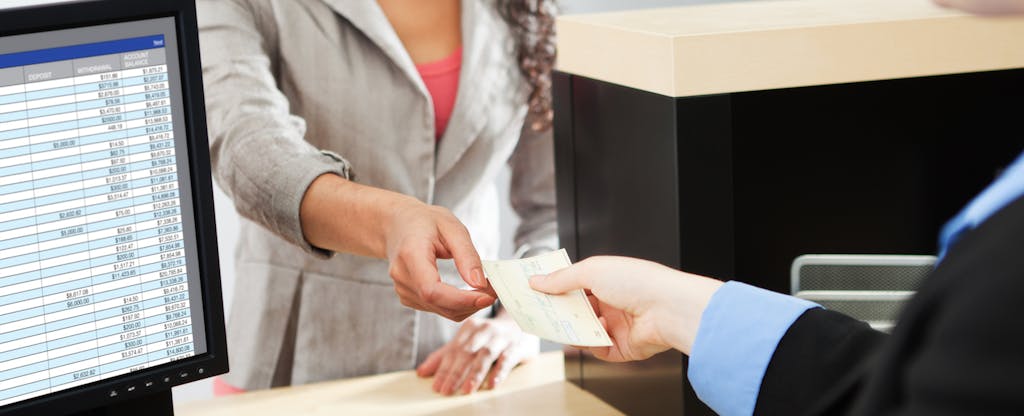In a Nutshell
Cashing a personal check is pretty simple, but in some cases it can involve fees. Here’s how to cash your check while keeping fees to a minimum.There are lots of places you can go to cash a check, but some are better than others. Follow these simple tips to find what works for you.
Receiving money is always nice, but being handed a paper check can feel like being given a chore. You’ve got to turn that payment into spending money, which might mean running an extra errand before you actually have cash in hand.
There are a few different ways you can cash a check, whether by visiting a bank, a credit union or even a variety of other businesses. But some options require more time and money spent than others. Read on to learn how to cash a check and determine the best option for you.
- How to cash a check at your bank
- How to cash a check at the issuing bank
- How to cash a check at a retailer
- How to deposit a check electronically
How to cash a check at your bank
For some, the most complicated part of cashing a check is deciding where to get it cashed. If you already have a checking account, you may be accustomed to visiting your local bank or credit union branch to complete certain financial transactions.
If that’s your preference, then you’re in luck. Cashing your check typically requires you to stop by the bank or credit union, endorse (sign) the back of the check, and present a valid ID to the bank teller. The transaction will likely be free of charge as a benefit of your membership.
Note that if the check is issued by a different bank than yours, you may be asked to deposit the check instead, and then wait 1–2 business days, after which the funds are usually available in your account. If this is your bank’s policy, and your bank offers the option, it may be more convenient to deposit the check electronically than to go through the hassle of visiting a branch.
How to cash a check at the issuing bank
If you don’t have a bank account of your own, the next best option can be to go to the bank or credit union that printed the check. As long as the check is written out correctly in your name, by one of the bank’s account holders, and there’s enough money in the account, you can likely cash the check there.
FAST FACTS
How do I open a bank account?
When you apply to open a checking or savings account, you’ll be asked to provide your name, date of birth, address, and an identification number, like a Social Security number. And you might have to deposit a minimum amount of cash.
The bank might pull credit reports when deciding to approve you for an account. Before applying, be sure to look at banking fees involved with opening and maintaining the account, like minimum balance fees and overdraft charges.
This process is typically identical to the check cashing process at your own bank: present the endorsed check and provide ID to a teller. But be prepared to pay a fee if you go this route. Some banks charge around $8 in order to cash a check if you’re not an account holder.
How to cash a check at a retailer
You may be able to cash a check by visiting a retail store that provides the service, like your local grocery store, which typically charges a fee. As a last resort, you can use a check-cashing service. Fees at these locations vary greatly, with some charging 12% of the check amount (or more), so be sure to compare costs if you’re looking at these services.
Just like with fees, the process of cashing a check through a retailer can vary. You may be required to set up an account before cashing your check, which could involve providing a combination of the following:
- Name
- Social Security number
- Phone number
- Address
How to deposit a check electronically
It depends on the bank. If you have a smartphone or tablet, and your bank offers the service, you can likely deposit the check using your bank’s mobile app. Simply log into the app and follow the prompts for a deposit, which typically include instructions on photographing the front and back sides of the check.
Bottom line
However you decide to cash your check, be sure to consider your options and any fees involved.
Cashing a personal check sooner than later may help you reduce the risk that the check will bounce, which happens when there aren’t enough funds in the account to cover the check amount. If you’re not sure that the person who wrote the check can cover the payment, you may want to ask, since a bounced check can potentially result in unexpected fees and money being deducted from your account.


